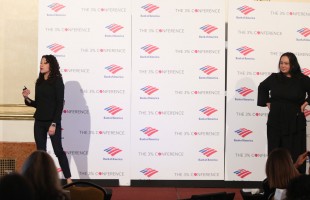
7 Messages for Those Who Haven’t Heard
Jessica Deutsch is a copywriter at Grey NY. She has been at the agency since 2016 and graduated from Lafayette College in 2015 with a degree in psychology. She enjoys thrifting, hiking, and hanging out with her dog Winona Ryder.
At the close of the recent 3% Conference, I walked away empowered, but also frustrated. To set the scene: the room was full of diverse people, including champions who’ve endured challenges and adversity – plus people truly hearing about this adversity, loud and clear, for maybe the first time. We were all together to talk and hear from each other. I thought: We’re all here to listen, and that’s amazing.
Now, I’m a 24-year-old creative, and I won’t pretend I’ve heard it all. But I’m passionate enough on the subject of diversity to be familiar with a lot of the concepts discussed on that stage. And when you’re hearing truths you’ve held true for a long time, it’s affirming, but you also ask yourself: To make change, what can we say that we haven’t said already?
And that’s where my frustration comes in.
I then asked myself: What would I, personally, say to those who haven’t heard? To those men and even women who haven’t heard, or refuse to hear?
And that’s where I think it’s incumbent on attendees like myself to amplify some of the messages from that stage. So, for those who haven’t heard…
Taking Time to Defy Assumptions Increases Speed
Although agencies value speed, being fast and effective means taking the time to ask the right questions and understand how who you are affects the way you answer other peoples’ questions. If people take the time to ask questions instead of assuming someone’s opinion or position (whether that person is a working mother, a gay coworker, a differently abled coworker etc.) they would have saved the time it took to retroactively fix mistakes. Ultimately, less assumptions mean fewer mistakes means more speed.
Encouragement Is Power
“Inclusion is nothing without power,” according to God-Is Rivera, VML director of inclusion and cultural resonance. How can we give women in the industry power? It’s simple. Through the sheer act of encouragement. Encouragement comes in many different forms. Give the mother in your office the flexibility to leave work early to pick up her child. While not a breakthrough in the realm of workplace flexibility, often times this privilege is granted in private, making the woman it is given to feel shameful. More direct discussion that it’s okay to have a flexible schedule gives women power over their work and personal lives without feeling guilty of neglecting either. As 3% Movement founder Kat said: create brave spaces instead of safe spaces. You need difficult conversations to be okay and supported, so everyone feels understood and welcome.
Think “Beyond Gender” with Systemic Change
As the conference theme illustrated, the path to diversity and equality doesn’t just stop at the opposite sex; it continues on towards people of color. Glenn Singleton, founder and president of the Pacific Educational Group, gave an incredible talk about thinking beyond gender. What stood out was Glenn’s take on systemic change; most agencies think they are implementing systemic change when really they are just providing random acts of equity - whether that is through a speaker, a workshop series, new diversity training, etc. To achieve systemic change, we need to ask: to what degree am I perpetuating the system in my agency?
Better Understand Privilege, Everyone
“Two of the most misunderstood words: privilege + patriarchy. Don’t mean wealth- don’t mean men,” Kat tweeted. One of the keynote speakers held a privilege exercise onstage with audience members; she read privilege-related statements aloud and if they applied to the participants they would step forward or backward. By the end, the participants were positioned all over the stage, with most surprised about where they stood. Privilege doesn’t automatically mean the white men in the room are standing at the front or that the black women are at the back. Recognize how you benefit more than others, understand how it negatively impacts them, and work to level the playing field. Remember: “Work to lift people as you climb.”
Diversity Improves the Work
When people who are different work together they make better work. It’s not enough to just have everyone in the same room, it’s about empowering everyone to use their voice. Making good advertising > Making advertising good – in that it’s more important to produce good, fair content instead of putting your agency first.
Speak Up to Be Heard Yourself
There were a lot of honest conversations and statements from women over the course of the conference. The most common behavior that stood out was when women explicitly stated they were afraid to say no to things or ask for flexibility, because, “If I don’t show up when I’m asked, I won’t get asked again.”
Inclusion means all of us. My wish is for everyone to feel that sentiment, and to have the conversations we were having in that room, and to share their own perspectives. I’d want people to know that this isn’t an Us vs Them. It’s all just Us.
I guess what I would want people to hear most is, if they weren’t there:
We wish you were there.




